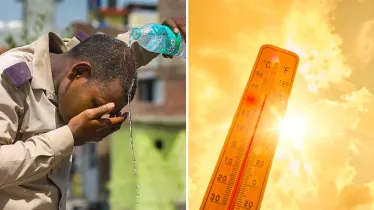As the country reels under a blistering heatwave, emergency rooms in parts of northern India are reporting a steady influx of patients suffering from dehydration and heatstroke. Health officials have raised concerns over the rising number of collapses linked to prolonged sun exposure, often occurring in public spaces, construction sites, and even homes without adequate cooling.
Doctors and emergency responders stress that timely intervention can be lifesaving.
“We are seeing one to two confirmed cases of heatstroke daily, many of whom require ICU admission,” said a senior physician at a Delhi government hospital. “In most cases, the patient had been outdoors for prolonged hours or had not consumed enough water.”
What to Do If Someone Collapses from Heat
Medical professionals outline the following steps for immediate first aid:
- Move the person out of the sun: Shift them to a shaded or air-conditioned area.
- Assess consciousness: If they’re unresponsive, call emergency services immediately.
- Positioning: If they’re breathing, lay them on their side and elevate the legs slightly to promote blood flow.
- Cool the body: Loosen clothing and use cool water, wet cloths, or fans to reduce body temperature—especially around the neck, armpits, and groin.
- Hydrate cautiously: Offer cool water or an electrolyte solution only if the person is fully conscious and not vomiting.
- Monitor closely: Look for signs of worsening—confusion, rapid breathing, or seizures—and keep medical help informed.
Understanding Heat-Related Illness
There are three major stages of heat-related illness:
- Heat Syncope (fainting): Often caused by dehydration and standing too long in the sun. Easily reversible with hydration and rest.
- Heat Exhaustion: Symptoms include fatigue, dizziness, nausea, and heavy sweating. Needs prompt cooling and fluid replacement.
- Heat Stroke: A medical emergency. Characterized by high body temperature, dry skin, altered mental state, and potential organ failure.
“Heatstroke can be fatal within minutes if not addressed with aggressive cooling,” said an emergency physician from Lucknow. “If body temperature exceeds 104°F (40°C), we recommend cold-water immersion or ice packs while en route to the hospital.”
Preventive Measures in the Face of Extreme Heat
With climate change intensifying the frequency and severity of heatwaves, public health advisories urge the following:
- Avoid outdoor activities during peak sunlight (11 a.m. – 3 p.m.)
- Wear breathable, light-colored clothing
- Stay hydrated with water and oral rehydration salts
- Avoid caffeine, alcohol, and high-protein diets
- Check on elderly, children, and laborers who are more vulnerable
A National Health Concern
The Indian Meteorological Department (IMD) has issued multiple red alerts for extreme heat across several states. The Ministry of Health and Family Welfare is also coordinating with state governments to expand emergency preparedness in hospitals and community health centers.
As India confronts rising temperatures year after year, the need for public awareness and real-time response to heatstroke incidents becomes critical.
“Early action is the difference between life and death,” doctors reiterate. “Recognizing the signs, staying cool, and calling for help can save lives.”


